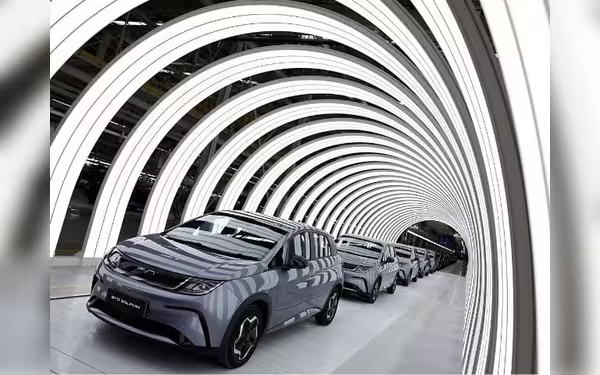Saturday, November 16, 2024 05:34 PM
EU Imposes Tariffs on Chinese Electric Vehicles
- EU tariffs on Chinese EVs could reach 45%.
- Protectionist measures aim to support local industries.
- Debate arises over protectionism versus free trade.
 Image Credits: tribune.com.pk
Image Credits: tribune.com.pkThe EU imposes tariffs on Chinese EVs to protect local industries, igniting a debate on protectionism versus free trade.
The European Union (EU), a group of 27 countries, has recently taken a significant step in the world of electric vehicles (EVs) by imposing new tariffs on imports from China. This decision, made on October 4, 2023, is aimed at addressing the growing dominance of Chinese EVs in the global market, which many believe poses a threat to local industries in both the EU and the United States. The EU's move to increase tariffs on these vehicles could reach as high as 45%, a substantial figure that reflects the seriousness of the situation.
The primary reason behind this protective measure is the belief that the Chinese government provides unfair and substantial subsidies to its car manufacturers. These subsidies allow Chinese companies to sell their EVs at lower prices, making it difficult for European and American manufacturers to compete. As a result, the EU is taking action to level the playing field and protect its own automotive industry.
This decision has sparked a debate about protectionism versus free trade. On one hand, supporters of the tariffs argue that they are necessary to safeguard local jobs and industries from being overwhelmed by cheaper imports. On the other hand, critics warn that such measures could lead to trade wars and higher prices for consumers. It is a delicate balance that policymakers must navigate, as they seek to support their domestic industries while also considering the potential repercussions on international trade relations.
As the global market for electric vehicles continues to grow, the actions taken by the EU may set a precedent for other regions facing similar challenges. Countries around the world are watching closely to see how this situation unfolds. Will the tariffs succeed in protecting local industries, or will they backfire and lead to increased tensions between nations?
The EU's decision to impose tariffs on Chinese EVs is a clear indication of the ongoing struggle between protectionism and free trade in the automotive industry. As the landscape of electric vehicles evolves, it is crucial for all stakeholders—governments, manufacturers, and consumers—to engage in thoughtful discussions about the best path forward. The outcome of this situation could have lasting implications for the future of global trade and the automotive market.













